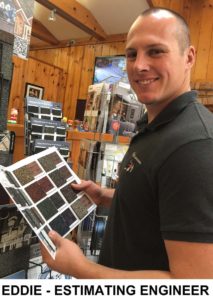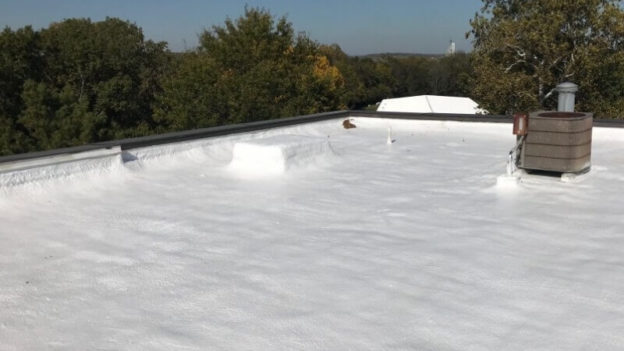One way of finishing your roof installation that’s grown in popularity recently is the spray foam roof – it provides a number of benefits to your roof’s integrity and particularly insulation, while being cost-effective (long-term) and easy to apply.
Is spray foam roofing right for you? In this article, we’re going to have a closer look at the spray foam roofing pros and cons
Spray foam roofing has become a particularly popular solution in the commercial roofing industry – but that doesn’t mean it can’t be right for your residential roof.
Now more than ever, architects are beginning to use materials and design features more common in commercial construction when building domestic homes, so spray foam has a number of uses in that industry as well.
If you want to know more about the pros and cons of spray foam roofing, you’re in the right place. So what are they?
Spray foam roofing pros
Here are some of the advantages associated with spray foam roofing:
1. It’s easy to install
 One of the big reasons why spray polyurethane roofing is becoming so popular is because of how easy it is to install.
One of the big reasons why spray polyurethane roofing is becoming so popular is because of how easy it is to install.
This can also save time and money when compared to other roofing solutions. The coating can be applied quickly by the right roofing contractor which means you can carry on using your roof building normally without any disruption.
SPF Roofing can easily be applied to all sorts of different roofs like shingles, concrete, metal and wood – adding an extra layer of protection.
2. It’s got good energy efficiency
Another big reason for the rise in popularity of spray on roofing is how energy efficient it is. It’ll help keep warm air inside your home when it’s cold, and reflect it when it’s hot – meaning you can save money on energy bills throughout the year.
Spray on roofing provides a solid level of insulation that helps make your roof much more energy efficient.
3. It’s easy and cheap to look after
When you’ve had your spray on roofing layer applied, you won’t need to spend much time or money getting it maintained over the years.
However, while it’s generally long-lasting and won’t require much maintenance at all, you will need to get it inspected twice a year just in case there has been any damage as some repairs might be needed.
4. It provides a good level of water protection
One of the main reasons for leaks in many other types of roofs is because of seams, but spray on roofs are seamless so this type of water damage is a thing of the past.
With a spray on roof, you can fill gaps, seams and cracks in your existing roof construction, giving you even more protection.
Spray on roofs can also be levelled out more easily, reducing the collection of water in ponds. The foam will also contract and expand depending on the weather which again reduces cracks.
All of these factors combined make spray on roofs some of the best protected against water damage and leaks.
5. It’s a sustainable solution
SPF system won’t require the original construction to be “torn-off” and produce minimal waste – that’s why it’s one of the most sustainable roofing solutions in the industry. The materials used are also considered to be highly environmentally friendly.
You can read more about roof tear-off in the article we wrote about tear off and overlay.
6. It lasts a long time
With the right maintenance and checks – a spray on roof can last up to 50 years.
7. It’s pays for itself in the long-run
Spray on roofs can be expensive to get installed, but this can easily pay for itself and more in the long run when you factor in how long it lasts as well as the amount you should save on energy costs.
Spray foam roofing cons
Here are some negatives to spray foam roofing that might make you want to consider a different option:
1. You need an expert to install it
Spray on roofing can’t be installed by any contractor – as it’s a highly specialized solution that needs immediate care and attention when installed.
That means you need a highly trained team of roofing experts to get the right finish and to make sure your roof is water-tight and completely ready to go.
Precision is needed as well as a full understanding of the chemicals that are being used and how they behave.
2. Some contractors aren’t as good
When you’re relying on the skill of a contractor, it’s important you find a good one.
While other roofing solutions are easy to install and have people in every town who are capable, spray on roofing requires specialist knowledge and experience, so finding the right contractor might not be straightforward, but it’s important you don’t settle for anyone who isn’t the best.
We recently wrote about the most important questions you need to ask a roofer before signing the contract and we recommend you take a look.
3. You can’t spray your roof throughout the year
If you need your roof sprayed in the winter, you might need to think again. You can’t spray a roof when it’s already damp, moist or icy.
4. You need to be careful when spraying
If you spray too much solution on the roof, overspray can occur – particularly when it’s windy. This can cause damage to nearby vehicles or other properties.
5. There are some maintenance issues
Small cracks can occur, especially in extreme weather – so you need to check your roof regularly (about twice a year) and fix any problems immediately.
6. You need a specialist to repair
As with the installation of your spray on roof, a highly trained specialist will be needed to repair your spray on roof.
7. It’s hard to remove
While spray on roofs are easy to install for the right roofing contractor, they aren’t as easy to remove and could be expensive if you decide you’d like a different roofing solution altogether.
Hopefully, you’ve now seen enough of the pros and cons associated with spray on roofing to make an informed decision for yourself.
With the right contractor, there are enough benefits to SPF roofing that it could be the right choice for you.
Feature image via inlandcoatings












